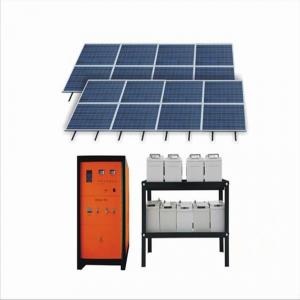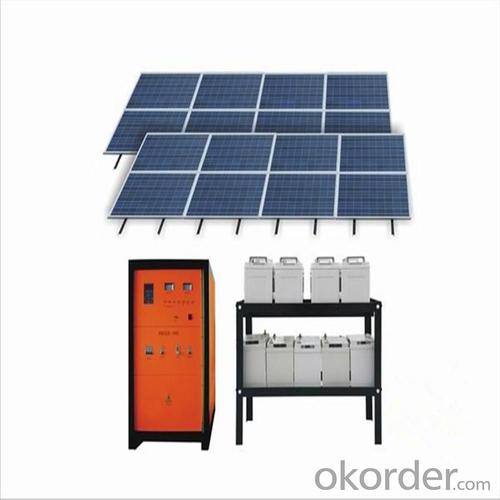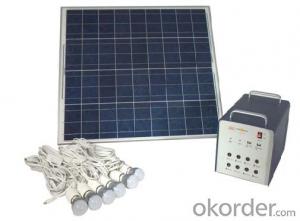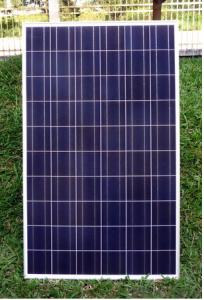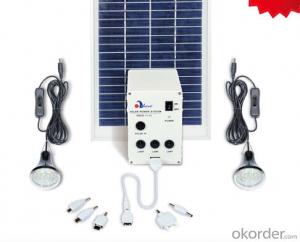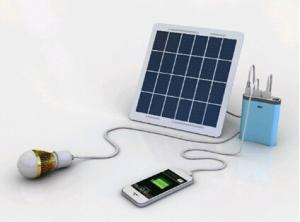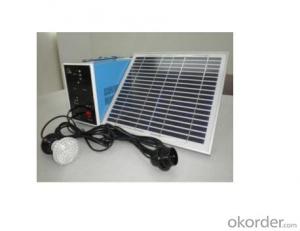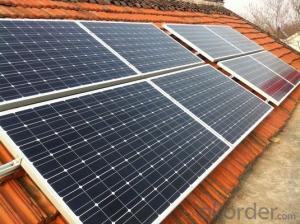Solar Energy Systems Workington - CNBM 150W High Quality Solar Home System
- Loading Port:
- China Main Port
- Payment Terms:
- TT or LC
- Min Order Qty:
- 500 Sets set
- Supply Capability:
- 200000 Sets per year set/month
OKorder Service Pledge
OKorder Financial Service
You Might Also Like
Details Of CNBM 150W Solar Home System High Quality
Item | EW-SHS150W | ||||||
Solar module | Type | Polycrystalline Silicon | |||||
Item/Qty. | SPS075 -12M / 2pcs | ||||||
Maximum power at STC(Pm) | 75 Wp | ||||||
Optimum operating current(Imp) | 21.6V | ||||||
Short circuit current(Imp) | 4.87A | ||||||
Dimensions l×w×h/Weight | 1195mm × 541mm × 28mm / 8kg | ||||||
Battery | Type | Lead-acid Maintenance-free Rechargeable | |||||
System Voltage | 24V | ||||||
Capacity | 100AH/12V, 2pcs | ||||||
Dimensions l×w×h/Weight | 329mm × 172mm × 229mm / 31kg | ||||||
Charge Controller | System Voltage | 24V | |||||
Max. module input short circuit current | 6A | ||||||
Dimensions l×w×h/Weight | 130mm × 88mm × 39mm / 0.165kg | ||||||
Inverter | Type | High frequency pure sine wave | |||||
Item/Qty. | SK300-224 | ||||||
Continuous Output Power | 300W | ||||||
Surge Rating | 600W | ||||||
Output Voltage | 220V / 50Hz | ||||||
Protection | Overload, Short circuit, Reverse polarity(FUSE) , Over/under input voltage, Over temperature. | ||||||
Dimensions l×w×h/Weight | 224mm × 164mm × 78mm / 1.8kg | ||||||
Control Box | Material | Steel box of zinc-plated and lacquer-coated | |||||
Color | Gray | ||||||
Dimensions l×w×h/Weight | 560mm × 550mm × 600mm / 23kg | ||||||
Capacity of Load: | Load | specification | Load power | number | Working hours/day | Expend/day | |
Saving light | 11W | 1 | 6 | 66Wh | |||
Television | 21inch | 70W | 1 | 2 | 140Wh | ||
Television receiver | 25W | 1 | 4 | 100Wh | |||
Total | 106W | 306Wh | |||||
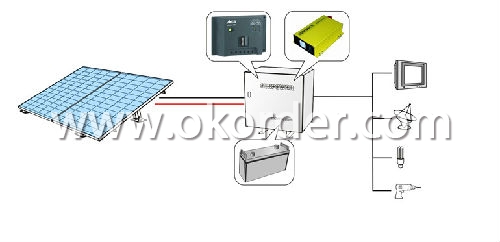
Packaging & Delivery Of CNBM 150W Solar Home System High Quality
Packaging & Delivery Of CNBM 150W Solar Home System High Quality | |
Packaging Detai | Packaging Detail:Export Carton and Pallet or under customer request. |
Delivery Detail:10-20days | |
Our advantages
•Professional products,brand power,group advantage.
•We can do OEM and ODM, and we have our own talented R&D teams
•All our products are easy to be used and convenient in maintanence
•Strong technical team is ready to work for you.
•Factory with 70000square meters,real factory price,top service.
- Q: Are there any risks of electrical short circuits with solar energy systems?
- Solar energy systems, like any other electrical system, have the potential for electrical short circuits. When there is an unintended path of low resistance, a short circuit occurs and allows a large amount of current to flow. This can be caused by faulty wiring, damaged components, or improper installation. Short circuits can lead to overheating, electrical fires, or system damage. The excessive current flow can melt wires, burn insulation, and even harm the solar panels themselves. In extreme cases, short circuits can cause explosions or other dangerous situations. To reduce the risks of short circuits, it is crucial to have qualified professionals install the system according to safety guidelines and local codes. Regular maintenance and inspections are also important for identifying and addressing potential issues. Installing a circuit breaker or fuse within the system can automatically disconnect the circuit in case of a short circuit. Using high-quality components and wiring specifically designed for solar energy systems can also help minimize the risks of short circuits. It is important to follow the manufacturer's instructions and guidelines for system maintenance and operation. In conclusion, although there are risks of electrical short circuits with solar energy systems, these risks can be effectively managed and minimized through proper installation, regular maintenance, and adherence to safety guidelines.
- Q: How do solar energy systems handle excess power generation?
- Solar energy systems handle excess power generation through a process called net metering. When the system generates more electricity than is being used, the excess power is sent back to the grid, and the owner receives credits for the excess electricity. These credits can then be used during times when the system is not generating enough power, such as at night or during cloudy days, allowing for a more balanced and efficient use of solar energy.
- Q: Can solar energy systems be used in remote locations without access to the grid?
- Yes, solar energy systems can be used in remote locations without access to the grid. Solar panels can generate electricity from sunlight, which can then be stored in batteries for later use. This allows for off-grid power supply in remote areas, making solar energy a viable and sustainable option for providing electricity in such locations.
- Q: Can solar panels be installed on floating platforms or buoys in bodies of water?
- Yes, solar panels can be installed on floating platforms or buoys in bodies of water. Floating solar, also known as floating photovoltaic (FPV) systems, are becoming increasingly popular due to their numerous advantages such as increased energy production, reduced land usage, and minimized water evaporation. These platforms or buoys are designed to withstand water conditions and can be installed in lakes, reservoirs, and even offshore.
- Q: Can solar energy systems be used for street lighting?
- Yes, solar energy systems can be used for street lighting. Solar-powered street lights are becoming increasingly popular as they offer a sustainable and cost-effective solution for outdoor lighting. These systems consist of solar panels that capture sunlight during the day and convert it into electricity, which is then stored in batteries. This stored energy is used to power the street lights during the night. Solar-powered street lights are not only environmentally friendly but also eliminate the need for extensive wiring and electricity consumption. They can be easily installed in remote locations where grid power is not available, making them a viable option for street lighting in both urban and rural areas. Additionally, solar-powered street lights offer the advantage of being independent from the main power grid, ensuring uninterrupted lighting even during power outages.
- Q: Can solar energy systems be used in powering construction sites or temporary structures?
- Yes, solar energy systems can definitely be used to power construction sites or temporary structures. In fact, solar power is increasingly being utilized in these scenarios due to its numerous advantages. Firstly, construction sites often lack access to traditional power sources, which makes solar energy a practical solution. Solar panels can be easily installed on rooftops, scaffolding, or even on the ground, providing a reliable source of electricity throughout the construction process. Secondly, solar energy systems offer flexibility in terms of power generation. They can be customized to meet specific energy demands of construction sites, whether it is for running power tools, lighting, or charging equipment. This adaptability ensures that construction activities can proceed smoothly without interruptions. Additionally, solar energy systems are environmentally friendly. By harnessing energy from the sun, construction sites can significantly reduce their carbon footprint and contribute to sustainable practices. Solar power does not produce harmful emissions or noise pollution, which is particularly beneficial in urban areas or sensitive environments. Furthermore, solar energy systems offer cost savings in the long run. While the initial investment for installing solar panels might be higher compared to traditional generators, the ongoing operational costs are significantly lower. Construction sites can benefit from reduced fuel expenses, maintenance costs, and reliance on fossil fuels. It is worth mentioning that solar energy systems can also be used for temporary structures such as mobile offices, portable restrooms, or event venues. These structures can be easily powered using solar panels, eliminating the need for generators or grid connections. In conclusion, solar energy systems are a viable and sustainable option for powering construction sites and temporary structures. They provide reliable, customizable, and cost-effective power solutions while minimizing environmental impact. As the global shift towards renewable energy continues, solar power will likely become even more prevalent in construction industry practices.
- Q: Are there any maintenance costs associated with solar energy systems?
- Solar energy systems come with maintenance costs. Although solar panels require minimal maintenance compared to other energy systems, there are still expenses involved. These include regularly cleaning the panels for optimal efficiency, inspecting and repairing any damaged or malfunctioning components, and occasionally replacing worn-out parts. Moreover, monitoring and maintaining batteries or inverters that store and convert energy may be necessary. It is also advisable to have a professional conduct an annual inspection to ensure proper functioning. While these maintenance costs are generally low compared to the savings generated from solar energy, it is essential to consider them when analyzing the overall installation cost.
- Q: Can solar energy systems be used for charging electric vehicles?
- Yes, solar energy systems can be used for charging electric vehicles. Solar panels can convert sunlight into electricity, which can then be used to charge the batteries of electric vehicles. This is a sustainable and environmentally friendly way to power electric vehicles, reducing reliance on fossil fuels and lowering carbon emissions.
- Q: How do solar energy systems impact the energy poverty gap?
- Solar energy systems have the potential to significantly impact the energy poverty gap by providing clean and affordable electricity to those who do not have access to reliable energy sources. Energy poverty refers to the lack of access to electricity and modern energy services, which affects millions of people worldwide. One of the key advantages of solar energy systems is their ability to generate electricity in a decentralized manner, making them suitable for off-grid and rural areas where connecting to the traditional power grid is often challenging and costly. These systems can be easily installed and are scalable, allowing for customized solutions based on the energy needs of a particular community or household. By harnessing the power of sunlight, solar energy systems can provide a sustainable and reliable source of electricity, reducing the dependence on traditional fossil fuels that are often expensive and environmentally harmful. This, in turn, helps to alleviate the financial burden on individuals and communities, as solar energy can be generated for free once the system is installed. Furthermore, solar energy systems also have the potential to stimulate economic development in energy-poor regions. By providing access to electricity, solar systems enable the establishment of small businesses, such as charging stations for mobile phones, refrigeration units for storing perishable goods, or even micro-grids to power communal services like schools and healthcare facilities. These economic activities can create job opportunities and improve the overall quality of life in these areas. In addition to economic benefits, solar energy systems also contribute to environmental sustainability. By generating electricity from renewable sources, they help reduce greenhouse gas emissions and mitigate climate change. This is particularly important in energy-poor communities that often rely on traditional energy sources, such as kerosene lamps or diesel generators, which emit harmful pollutants and contribute to air pollution. In conclusion, solar energy systems have a profound impact on the energy poverty gap by providing clean, affordable, and sustainable electricity to those who lack access to modern energy services. They offer a decentralized and scalable solution that can stimulate economic development, improve quality of life, and contribute to environmental sustainability.
- Q: What is the impact of lightning on the performance of solar panels?
- The impact of lightning on the performance of solar panels can vary depending on the specific circumstances. In some cases, lightning strikes can cause direct damage to the panels themselves, leading to reduced or even complete loss of functionality. Indirect effects, such as power surges or electromagnetic interference, can also disrupt the operation of solar panels and related equipment. However, with proper installation and protective measures in place, the risk and impact of lightning strikes can be minimized to ensure the optimal performance and longevity of solar panels.
Send your message to us
Solar Energy Systems Workington - CNBM 150W High Quality Solar Home System
- Loading Port:
- China Main Port
- Payment Terms:
- TT or LC
- Min Order Qty:
- 500 Sets set
- Supply Capability:
- 200000 Sets per year set/month
OKorder Service Pledge
OKorder Financial Service
Similar products
Hot products
Hot Searches
Related keywords
